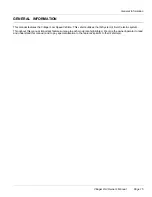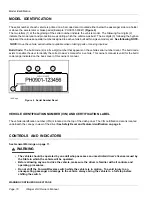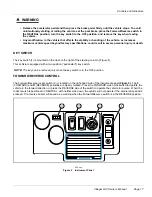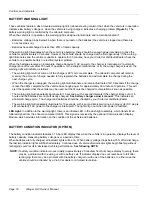
Storage
WARNING
• Avoid stopping on a hill when towing. If you must stop on a hill, avoid sudden starts or rolling
backwards and stopping suddenly. Failure to heed this warning could cause the vehicle to overturn,
possibly resulting in severe personal injury.
• Reduce normal driving speed when transporting a Club Car vehicle on a trailer.
• Do not tow a Club Car vehicle behind a passenger vehicle or truck on a public road unless it is on an
approved trailer.
• For use on public roads, the trailer must meet all federal, state, and local requirements such as
taillights, brake lights, etc.
• The vehicle to be transported should be tied securely to the trailer, with the Forward/Reverse handle or
switch in the NEUTRAL position, the key switch in the OFF position, and the park brake firmly engaged.
• Because of the added length of the trailer, use caution when making turns.
• Do not transport the vehicle on a trailer with a load in the vehicle cargo bed.
• Secure the seats before transporting on a trailer.
If the vehicle must be transported over long distances or on public highways, it should be transported on an approved
trailer that has the following approved load rating per vehicle being transported:
Villager 2 LSV : 1069 lb. (486 Kg)
Villager 2+2 LSV :1129 lb. (512 kg)
NOTE:
A two-car trailer should be rated at:
Villager 2 LSV : 2 x 1069 lb. = 2138 lb. (2 x 486 kg = 972kg)
Villager 2+2 LSV : 2 x 1129 lb. = 2258 lb. (2 x 512 kg = 1024kg)
STORAGE
See General Warnings on page 11.
WARNING
• Turn the key switch to the OFF position, remove the key, and leave the Forward/Reverse handle or
switch in the NEUTRAL position during storage. This is to prevent unintentionally starting the vehicle
or a fire hazard. Place Tow/Run switch in the TOW position.
• Do not attempt to charge frozen batteries or batteries with bulged cases. Discard the battery in
accordance with all environmental laws or return to an authorized Club Car dealer. Frozen batteries
can explode.
CAUTION
• Batteries in a low state of charge will freeze at low temperatures.
• To avoid exposing electrical components to moisture and subsequent damage, do not use any type or
pressure washing or steam cleaning equipment to wash the vehicle.
PREPARING THE VEHICLE FOR EXTENDED STORAGE
1.
Unload the vehicle so that tires are supporting only the weight of the vehicle.
2.
Fully charge batteries.
See Charging Batteries on page 39.
3.
Batteries should be clean and free of corrosion. Wash tops and terminals of batteries with a solution of baking
soda and water (1 cup (237 mL) baking soda per 1 gallon (3.8 L) of water). Rinse solution off batteries. Do not
Villager LSV Owner’s Manual
Page 29















































